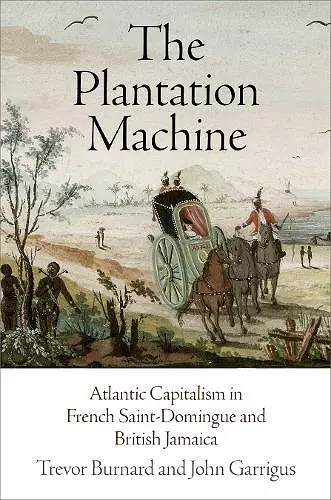The Plantation Machine
Atlantic Capitalism in French Saint-Domingue and British Jamaica
Trevor Burnard author John Garrigus author
Format:Paperback
Publisher:University of Pennsylvania Press
Published:10th Aug '18
Should be back in stock very soon

This book explores the brutal yet successful slave societies of Jamaica and Saint-Domingue, focusing on the development of their plantation systems and the social dynamics involved.
In The Plantation Machine, authors Trevor Burnard and John Garrigus delve into the brutal yet successful slave societies of Jamaica and Saint-Domingue during the eighteenth century. These plantation regimes are likened to complex 'machines' that were meticulously fine-tuned by planters, merchants, and officials to maximize the exploitation of enslaved workers while serving the interests of their empires. Through extensive archival research, the book traces a pivotal half-century in the evolution of the social, economic, and political structures that enabled these societies to thrive.
The narrative highlights the striking similarities between Jamaica and Saint-Domingue, even as the two colonies were embroiled in conflict with one another. Both regions faced intense struggles, including violent confrontations between masters and enslaved individuals, a tightening of racial laws, and a growing slave trade. The authors focus on the Seven Years' War and its aftermath, revealing how specific events, such as a slave poisoning scare in Saint-Domingue and a concurrent slave revolt in Jamaica, solidified white dominance in both colonies.
Ultimately, The Plantation Machine argues that local political dynamics, rather than emerging racial ideologies, were crucial in shaping the distinctive forms of racism that developed in these societies. As the American Revolution presented new challenges, the late eighteenth century saw unprecedented prosperity for whites in Jamaica and Saint-Domingue, while the suffering of blacks intensified, underscoring the colonies' vital roles within the broader American empires of Britain and France.
"[The Plantation Machine is] an exciting intellectual history of the place and agency of the plantation system in the making of eighteenth-century Atlantic capitalism. In their analysis of the two largest and most profitable sugar colonies in the Caribbean from 1740 to 1788, a crucial several decades in that region's history, these two scholars ask us to forget what we already knew upon opening their book, as they present us with fresh insights on two paralleled pasts."-American Historical Review
"The Plantation Machine is in many ways, the strongest one-volume history of Saint-Domingue written thus far in English . . . {It] is essential reading for any scholar of the eighteenth century or French capitalism and industrialization or anyone who still considers Napoleon I's empire to be the first French empire."-H-France
"The Plantation Machine is an ambitious and important book. The collaborative work of Trevor Burnard and John Garrigus, combining deep research into French and British Caribbean plantations and slavery, depicts the two leading plantation slave societies at the peak of their wealth, power, and brutality. This book should be read by early Americanists and Atlantic World and even European historians who want to understand plantation slavery and its place in the Atlantic and Euro-American worlds."-Simon Newman, University of Glasgow
"Jewels in the crowns of the British and French empires, the neighboring sugar islands of Jamaica and Saint Domingue dominated the Atlantic economy of the eighteenth century and were central sites in the period's world-shaking wars. This pathbreaking dual history by two leading experts shows us how the ruthless exploitation of slaves in the Caribbean produced the wealth that inspired the period's faith in progress and shaped the rivalry between Europe's two leading powers."-Jeremy Popkin, University of Kentucky
ISBN: 9780812224238
Dimensions: unknown
Weight: unknown
360 pages